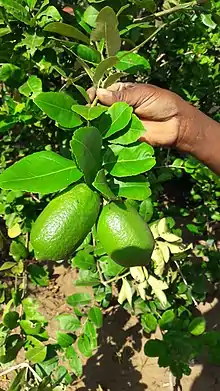
The Assam lemon, also known as nemu tenga in Assamese, are cultivars of lemon, which are found and cultivated in the Indian state of Assam.[1][2] The most popular of them are 'Gol Nemu' and 'Kaji Nemu'. These lemons are an important part of Assamese cuisine .These lemon are also famous for their significant smell.
Assam lemons are used for preparing refreshing drinks and pickles as well as garnishing curry and other dishes.[3]
Other citrus from Assam includes Jora Tenga, Bore Tenga, Elaichi Tenga etc.[2]
Varieties
Gol Nemu
Gol Nemu is similar to the other lemons found in India. Its botanical name is Citrus jambhiri.[4] It is round but smaller than other varieties and has an aroma.[5] It is sweeter than other lemons and Kaji Nemu. It has lots of medicinal value.When the lemon ripens, its colour changes to yellow and it becomes sweeter.
Kaji Nemu

Kaji Nemu is other variety of this lemon and is elongated and oblong compared to others and is also seedless.[6] Its botanical name is Citrus limon and is a GI-certified product.[4][7] This lemon is generally juicer than Gol Nemu due to its longer size. It is popular in Assam and is associated with Assamese cuisine. It is also found in west bengal known as gondhoraj. It is as generally larger than Gol Nemu and also turns yellow during ripening.[8][9]
Major producing districts include Dibrugarh, Golaghat, Cachar, Chirang, Nalbari and Dima Hasao.[10]

Comparison of some varieties
| Name[4] | Kaji nemu | Gol nemu | Jora tenga |
|---|---|---|---|
| Botanical Name | Citrus limon | Citrus jambhiri | Citrus medica |
| Growth Habitat | Bushy spreading | Erect | Erect |
| No. of fruits per plant | 150 - 200 | 100 - 120 | 50 - 80 |
| Length of fruit (cm) | 7 - 9 | 4 - 5 | 10 - 15 |
| Fruit weight (g) | 90 - 100 | 40 - 60 | 120 - 180 |
| Peel thickness (cm) | 0.50 - 0.75 | 0.70 - 0.90 | 0.80 - 1.02 |
| Juice per fruit (cm3) | 22 - 25 | 16 - 18 | 20 - 23 |
| Seeds per fruit | 0 | 5 - 6 | 8 - 10 |
| Acid (%) | 3.0 - 3.3 | 2.8 - 3.0 | 2.0 - 2.5 |
| No. of segments per fruit | 9 - 12 | 6 - 8 | 11 - 15 |
| TSS (0Brix) | 6.35 - 6.38 | 6.20 - 6.50 | 6.50 - 6.90 |
| Ascorbic Acid (mg/ml) | 1.50 - 1.65 | 1.20 - 1.45 | 0.90 - 1.10 |
References
- ↑ "Lemon Cultivation -". 22 September 2013. Retrieved 11 May 2018.
- 1 2 "Indigenous Collections of Citrus from Assam". ICAR-NBPGR Cryo Database. Retrieved 2 August 2022.
- ↑ "Design and Development of a Hand Operated Assam Lemon Fruit Harvester". Sustainability and Social Innovation Lab. Retrieved 11 May 2018.
- 1 2 3 "'Kaji nemu' A registered product under the Geographical Indication of Goods (Registration and Protection) Act, 1999" (PDF). Assam Agricultural University, Jorhat, Assam. Retrieved 2 August 2022.
- ↑ Desk, DE News (7 August 2020). "A Guide to the Lemons of Assam - Discover East - Food of Assam". Discover East. Retrieved 3 August 2022.
- ↑ "Australian finger lime: Citric caviar - Outlook Traveller". Outlook Traveller. Retrieved 15 February 2018.
- ↑ Karelia, Gopi (17 August 2021). "Assam's 'Accidental' Seedless Lemon Variety Doubles Farmer Profits in UK". The Better India. Retrieved 2 August 2022.
- ↑ "Precious Lemons". natasha-pointstoponder.blogspot.in. 19 June 2014. Retrieved 15 February 2018.
- ↑ "ASSAM LEMON (Citrus Limon L. Burmf)" (PDF). www.kiran.nic.in.
- ↑ Desk, Sentinel Digital (27 March 2022). "Kaji Nemu - Sentinelassam". www.sentinelassam.com. Retrieved 2 August 2022.